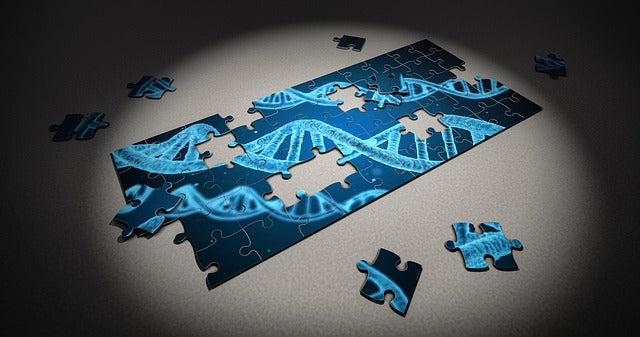
Some Diets Might Not Work Because Of Genetics
I’m not the kind of physician to recommend a “diet,” at least not in the typical sense of the word.
Instead, I believe people should practice logical lifestyle choices over “diets.”
Here’s an example. If you’re aware of the dangers of sugar and how various kinds of sugar can negatively affect your health, then it makes sense to start eating less sugar.
The same thing is to be said for eliminating things like gluten, dairy, soy, legumes, and a list of other problematic foods.
Now here’s the thing about diets, aka logical lifestyle choices. Making a smart decision to eat a certain way doesn’t always have the desired outcome. This is especially true for people who find that no matter how hard they try, they can’t lose weight.
So what gives? Why is it that what works for one person doesn’t necessarily work for another?
I’ve held my own personal beliefs on the subject close to my chest, mainly because they’re personal beliefs and are based on a loose assembly of scientific fact, but aren’t provable per se.
However, I’ve long-suspected that what works for one person might not work for another, and a new study released by researchers at Texas A&M University seems to confirm this.
As the researchers concluded, certain diets work for some people and not others because of genetic differences.
Sure, that makes sense, right?
Take a look at how they came to this conclusion.
David Threadgill, Ph.D. and his associate William T. Barrington were curious why some people could lose weight following a particular diet and another person couldn’t.
They started with the assumption that the U.S. government’s dietary recommendations should be enough to help people lose weight. Then they asked themselves if these guidelines, which are supposed to help people lose weight, didn’t work, what other factors might be at work.
"In the face of the obesity epidemic," he continues, "it seems like guidelines haven't been effective." Threadgill and his team hypothesized that genetic differences might influence how someone responds to a diet.
To figure out what was going on, the researchers used mice to test whether or not genetics had anything to do with how the physical characteristics of the subjects were affected by food.
So, they actually created 4 different strains of mice (I know, Frankenmice are scary stuff) and then fed them 4 different diets.
Here’s what Ana Sandiou reported on this experiment.
The diets were designed so that they were the equivalent of four historically popular human diets: the American/Western diet, the Mediterranean diet, the Japanese diet, and the Maasai/ketogenic diet.
The American diet was high in fats and refined carbs, the Mediterranean one was higher in fiber and included red wine extract, the Japanese diet consisted of rice and green tea extract, and the ketogenic diet was high in fat and protein but consisted of very few carbs.
"We matched fiber content and matched bioactive compounds thought to be important in disease," Barrington explains, in order to get the rodents' diets to be as similar as possible to the human ones.
The mice were also fed a control diet consisting of standard chow. The researchers monitored the mice's cardiometabolic health, measuring their blood pressure, blood sugar, cholesterol levels, and looking out for signs of a fatty liver.
Levels of physical activity were also monitored, as well as the rodents' appetite and food intake.
One size really doesn't fit all
Overall, the three "alternative," healthier diets did seem to work for most mice, but the fourth genetic strain responded very badly to the Japanese diet.
As for the ketogenic diet, two genetic strains responded very well to it, and two very poorly.
"One became very obese, with fatty livers and high cholesterol," Barrington says, while the other had more fat and became less physically active, despite maintaining a lean appearance.
This equates to what we call 'skinny-fat' in humans, in which someone looks to be a healthy weight but actually has a high percentage of body fat," explains the first author.
As expected, the American-style diet increased weight gain and metabolic syndrome in most mice. The Mediterranean diet, on the other hand, had mixed results, with some mice staying healthy, and others gaining weight.
What that showed the authors of the study is that different foods affect people in different ways.
Again, that seems to confirm something we all knew, at least something we all suspected. The bigger question is what does that mean for an individual who’s attempting to lose weight?
How are they supposed to eat?
I’m going to lay down some “blanket advice” here that I think will prove useful to anyone struggling with “diets” and their lack of apparent effectiveness.
The first is this.

Eliminate as much sugar from your diet as possible. Sugar is the enemy of so many people’s waistlines and yet people still believe it’s fine to eat.
A package of Yoplait fat-free yogurt containing 23 grams of sugar is not your friend.

From there, eliminate as many processed foods as possible. Processed foods contain harmful ingredients that affect how your body absorbs nutrients.

Then, I’d switch to eating a diet that consists of mostly plants, 3-5 oz. of high-quality meat, some fruit and eat that type of a meal 3-4 times a day.
Don’t eat too much, and don’t eat too little.
That’s a good starting point.
If that doesn’t work then it’s time to get some genetic testing/food allergy testing done to see if what you’re eating is getting in the way of losing weight.
Talk soon,
Dr. Wiggy
www.HealthAsItOughtToBe.com



